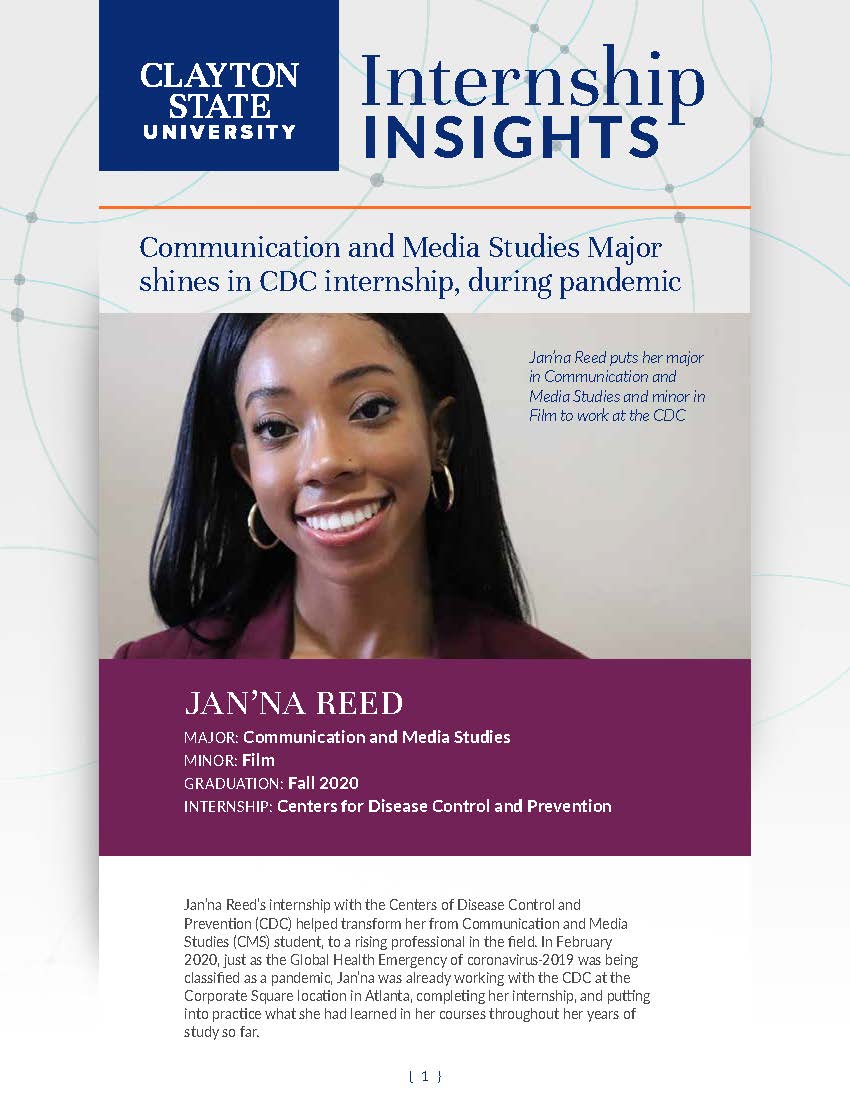
Communication and Media Studies Internships
All Communication and Media Studies majors are required to complete one internship for credit (minimum 3 hours), and have the option of completing up to three internships for credit, with the approval of the faculty coordinator.
In their internships, students complete a minimum of 150 hours of work over the course of a semester, for a company or organization while receiving experience, training, and mentorship from a qualified supervisor.
Student Eligibility
In order to register for CMS 3901--Internship/Practicum for CMS, students:
- must be a Communication and Media Studies major
- must be in good academic standing
- must have earned at least 30 credit hours
- must have completed the course prerequisites, including:
- COMM 3100 with a minimum grade of C OR
- COMM 3300 with a minimum grade of C AND
- CMS 3101 with a minimum grade of C
- must have the approval of the faculty coordinator, Professor Steve Spence
Approval will only be given to students who have been accepted into an internship with a registered business, nonprofit, or government agency. The internship must directly relate to the student’s area of study and future career goals. It must advance a set of learning objectives to which the student and their site supervisor have agreed.
Approval will only be given to students who have completed an Internship Learning Agreement Form:
- Download the Internship Learning Agreement form from the link in the left menu of this page.
- Complete the form in consultation with the internship site supervisor.
- Student and internship site supervisor sign the form.
- Scan and send the completed, signed form to Dr. Steve Spence
Once you have completed these steps, then you will be registered for CMS 3901--Internship/Practicum for CMS.
How to Find an Internship
- Take advantage of your personal and professional networks. Talk to family, friends, peers, present and former supervisors and coworkers. Let them know that you are looking for an internship, and see if they know of any opportunities.
- Attend the annual Creative Careers Job Fair hosted by the Department of Film, Communication, and Performing Arts, hosted the first Friday in November
- Attend career fairs and other events hosted by Career Services.
- Look through the websites of employers in your area. Some of them—especially larger employers—will have internship opportunities posted.
- Contact employers in your area. Email them, call them, visit their offices.
- Be on the lookout for emails from Career Services and faculty.
- Regularly check Laker Career Zone for internship postings.
- Contact Professor Spence and let him know what type of internship you are looking for, and what semester(s) you would be able to do an internship. He will add you to a contact list.
How to Get an Internship
- Before you start looking for internships, make sure you have a solid resume. Career Services will help you with this.
- Carefully follow the directions for applying.
- Check your email regularly (at least once per workday) and respond quickly when contacted by organizations with internship opportunities.
- Expect to be interviewed. Career Services has resources that will help you make a good impression.
How to Develop Learning Objectives for Your Internship
Once you have been offered an internship, you must work with your site supervisor to identify three specific educational goals for your experience. These help to ensure that students and supervisors share an understanding of the internship, and that the internship helps students to achieve their educational and professional goals. When developing your learning objectives, keep the following in mind:
- Learning objectives should be clear enough so that the student, site supervisor, and faculty coordinator trust that they are on the same page. (Examples include: “web design,” “social media marketing,” “event planning,” “interviewing,” and so on.)
- Learning objectives should NOT be unique to a particular company. The idea is that the skills you learn will be useful in other situations in the future. (For example, you would NOT want to write “developing a marketing campaign for company X.” The broader skill that you are learning is “marketing.”)
- For each learning objective, note a few specific tasks, duties, or responsibilities that you will take on. (For example, if your learning objective is “event planning,” specify the event(s) that you will be working on, what kind of tasks you will be responsible for, and so on.)
- Make sure to develop the learning objectives in collaboration with your supervisor, and discuss your progress on those learning objectives regularly during the internship . (Your site supervisor’s evaluation of you will be based in part on your progress with regard to these learning objectives.)
What to Expect?
Most of your time during the internship will be spent working as directed by your site supervisor. (You must document at least 150 hours in order to receive a “C” or above in CMS 3901.) In addition to work at your internship site you will submit logs of your hours on a regular basis, and you will complete a few other assignments.
- an introductory paper in which you discuss your expectations for the internship
- a resume
- a final paper in which you reflect on the internship experience
- samples of work from your internship
- a survey in which you evaluate the internship site and your site supervisor
Read about one CMS student, who excelled through an internship at the Centers for Disease Control (CDC).

